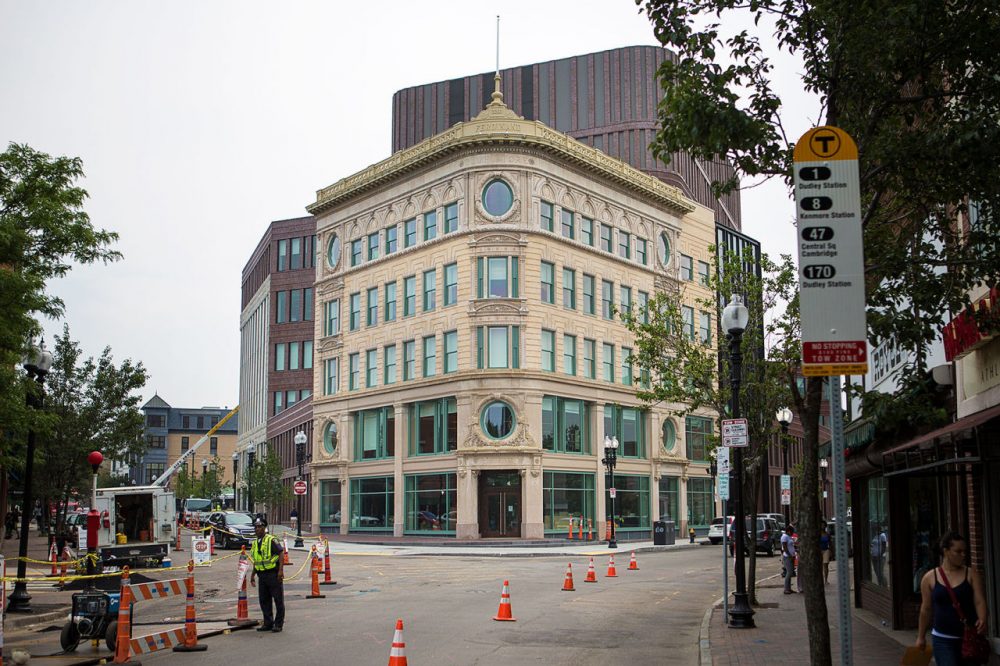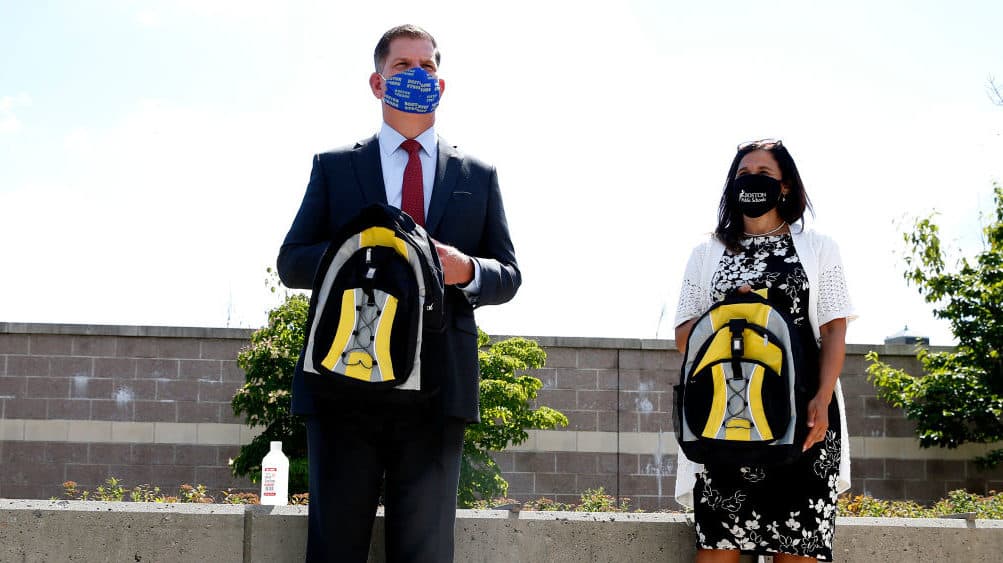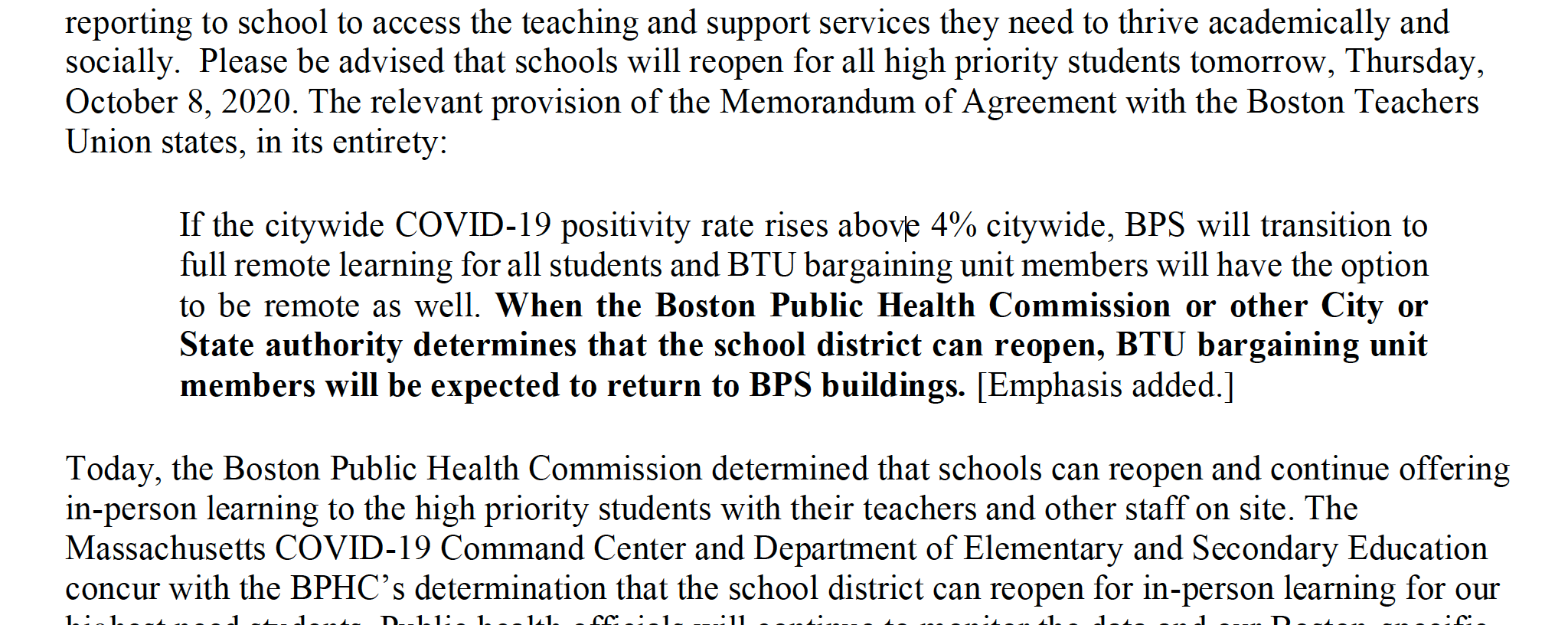Advertisement
Judge Rules In-Person Learning Can Continue In Boston Public Schools, Despite Rising Coronavirus Rates

A Superior Court judge has ruled that Boston Public Schools can continue in-person teaching, despite rising rates of coronavirus in the city.
Late last week, the Boston Teachers Union asked for an injunction, noting that the positivity rate on all of the city's coronavirus tests was then above the agreed-upon weekly threshold of 4%.
At the moment, only about 1,300 students — less than 2.5% of the district's overall enrollment — are entering buildings each day. The eligible students are those who would suffer most from missing in-person instruction, including those with severe medical and emotional disabilities, those experiencing homelessness, and those at the earliest stages of learning English.
The union argued even that limited in-person instruction — serving only the highest-needs students, comprising about 5% of overall enrollment — violated a memorandum of agreement both parties signed on Sep. 9.
But in a 21-page decision (PDF) after a hearing held over Zoom on Wednesday morning, Judge Robert Gordon declined.
"The Court sees no material breach of contract in the actions taken by Boston Public Schools," Gordon wrote, adding that the injunction "would subvert the best educational judgments of those organizations entrusted by law to harmonize the competing concerns over learning and safety."

The controversy — and tonight's ruling — turned on the interpretation of two sentences in the Sept. 9 agreement between the union and the district (PDF).
The first states that, if the citywide COVID-19 positivity rate rises above 4%, "BPS will transition to full remote learning for all students and BTU bargaining unit members will have the option to be remote as well." But the next sentence says BTU educators "will be expected to return" to buildings once the Boston Public Health Commission deems it safe.
Last Wednesday, Oct. 7, the commission reported that the citywide rate crossed that threshold — if only slightly — to 4.1%. (As of this Wednesday, it had climbed further: to 4.4% citywide.)
But within hours, city health officials also told district officials that it was safe to continue operating under the limited in-person model, according to a Boston Public Health Commission spokesperson.
On the evening of Sept. 7, Superintendent Brenda Cassellius invoked that agreement's second sentence — and the health commission's advice — in an email to staff, saying that schools would be open teachers would be expected. Several principals across the district repeated that message, telling reluctant or absentee staff — including some with health problems — that further failure to report might constitute "insubordination" or "conduct unbecoming of a teacher."

In their complaint, the teachers union's attorneys described the argument that schools closed and reopened over the course of an afternoon as "too clever":
On October 1, 2020, BPS opened to in-person student services. It did not close on October 7, 2020. It has not closed at all since it opened on October 1, 2020. Thus, it cannot open again.
(A footnote pointed to the dictionary definition of the word "reopen.")
Meanwhile, district officials argued that — however hurriedly — the Boston Public Health Commission played its specified role as "referee" on Oct. 7.
Gordon agreed, saying the agreement as signed specifically "assigned the judgment of whether and when teaching could safely occur within BPS facilities to independent health care professionals" at the health commission.
Some educators complained on social media, pointing out that — as with the Boston School Committee — Boston Public Health Commission members are appointed by the mayor.
In a statement issued after Gordon's ruling, teachers union President Jessica Tang sounded a conciliatory note.
While Tang repeated that the union holds a different interpretation of the agreement, she said she hopes to develop a plan with the district "that includes safe staffing ratios, that reduces the viral footprint in our school buildings, and that ensures high-quality in-person instruction for our highest-needs students."
So far, school leaders have apprised families of at least six positive tests among the district's students and staff, including two at the Lee K-8 School in Dorchester — but it isn't yet known whether those cases were transmitted in school buildings.
In the September agreement, the district also committed to providing "publicly available weekly reports on incidents of infection by school," but so far no such reports have been published to the district website.
In a statement, a BPS spokesperson said the district would start publishing that data Friday, but would "only provide data if there are more than 5 cases in each school community," citing privacy concerns.
While Boston's overall positivity rate is at 4.4%, some neighborhood rates remain a good deal higher. In Hyde Park and parts of Dorchester, the rates the city reported on Wednesday were north of 9%.
